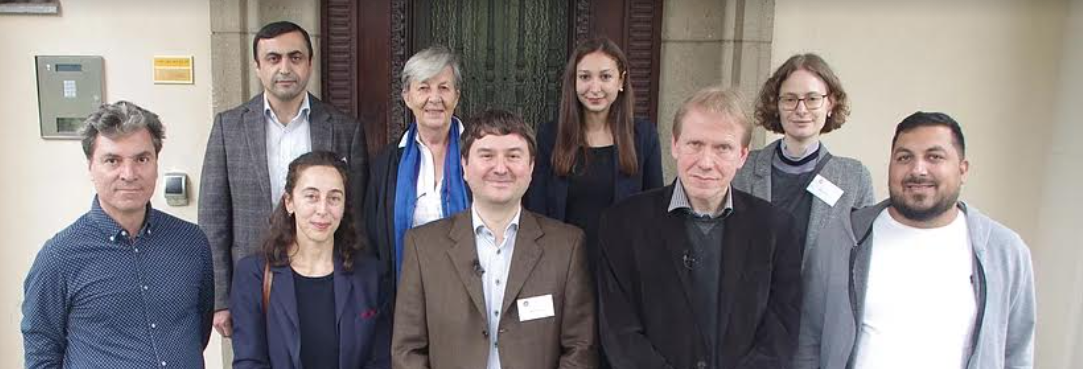On the last weekend of August 2021, 16 scholars from around the world gathered for a 3-day international conference focusing on the heritage of WW1, including mass crimes and political violence as well as the development of humanitarianism and international justice.
Entitled “Genocide, Mass Violence and International Justice after 1919”, the conference was organized by the Lepsiushaus in Potsdam, in partnership with the Armenian General Benevolent Union (AGBU Europe), the Phiren Amenca International Network and the European Union of Jewish Students (EUJS), with the support of the Europe for Citizens Programme of the European Union.

The event was held at the European Academy in Berlin, in a hybrid format that allowed those who could not be present on-site to join the four panels online and in honor of Dr. Rolf Hosfeld, historian, writer and academic director of the Lepsiushaus, who passed away in July, shortly before the event. The international conference in Berlin was, in large part, the result of Dr. Hosfeld’s dedication and commitment in bringing together distinguished scholars from around the world to share their research on the history of the interwar period. All the speakers paid tribute to the much-respected historian who was also a close friend to some of them.
Together with others, Atanas Stoyanov from the Phiren Amenca International Network opened the event with a welcome address highlighting the importance of collaboration between Roma, Armenians, Jews and other ethnic communities who have suffered historical oppression and discrimination with a call for common advocacy. Consequently, Dr. Roy Knocke presented the keynote address based on the last manuscript prepared by late Dr. Hosfeld, “No Peace to End All Violence”, which gave the tone of what would be discussed in more details over the weekend. Dr. Knocke explained that if the 20th century started with a devastating world conflict, in 1918, the first world war was perceived to be “the war that will end war”. It was believed to be the start of a new peaceful era, free from all conflicts, which would last forever.
The four panels of the conference spread over the weekend gave the opportunity to examine in detail this particular period between the two world wars and provide some answers. The first two panels focused on the development of political violence and radical political ideology in the post-war years. Post-Versailles Europe was discussed in the presentations of Stefan Ihrig, Momme Schwarz and Chalak Kaveh, which included an account of the influence of the Young Turks on the Nazi movement, a description of the attempts to protect Jews as a minority following the collapse of the empires and an overview of the radical “gypsy policies” in Norway and Germany between the two wars. Michael B. Elm and Vicken Cheterian’s presentations focused on the Middle East, touching upon the questions of remembrance, trauma, genocide and denialism, while Fatma Müge Göçek discussed more particularly the complexities of denialism in Turkey.
The last two panels revolved around the movement for peaceful international solutions and justice and for the rescue of the victims, including those of the Armenian genocide. Hülya Adak spoke about the scholar, diplomat and human rights activist Andrei N. Mandelstam and his plan to rescue the Armenians from the Ottoman repression as well as his contribution to the 1st declaration of human rights. Roy Knocke described the plight of the stateless refugees following WW1 and the contribution of Fridtjof Nansen. Edita Gzoyan reviewed the consequences of the violence against women and children, during the Armenian genocide and the role of the League of Nation from a legal point of view. Melanie Tanielian’s presentation focused on independent initiatives to support humanitarian missions to save the Armenian orphans following the Adana massacres of 1909, with the particular case of the German Kaiserswerth Deaconate. Hilmar Kaiser spoke about the Armenian origins of the Near East Relief and the active role of Armenians during the genocide and, finally, Charlie Laderman presented the interventions of the British and the Americans to save the Armenians and remake global order.
The presentations and discussions demonstrated the importance of the current research on the interwar period, analyzing it from different perspectives and putting forth a new understanding of the 20th century, the impact of which is still felt today, in particular in the various contemporary conflicts of the Middle East.
“The past is never dead. It’s not even past.” This quote by William Faulkner, mentioned by Dr. Knocke in his keynote address, could not resonate more strongly today as the project “Ideas & their Consequences: Genocide and International Justice after 1919” continues to reflect on our history with additional lectures scheduled in the coming weeks.
To learn more about the project and upcoming events, please visit: https://www.genocideandjusticeafter1919.com/



